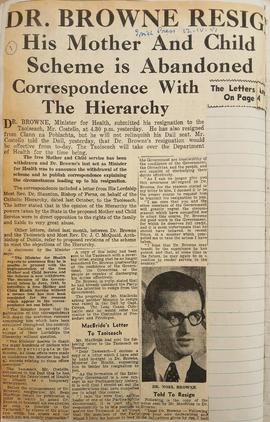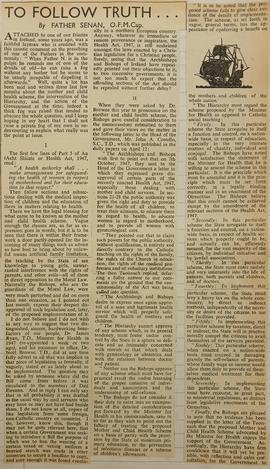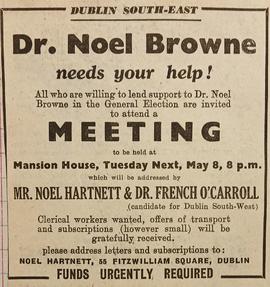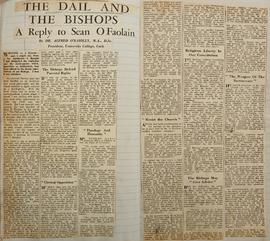referentie code
Titel
Datum(s)
- c.1946-1952 (Vervaardig)
Beschrijvingsniveau
Omvang en medium
c.250 pp; 32.5 cm x 20 cm; Bound volume; newspaper clipping, manuscript, and typescript
Naam van de archiefvormer
archiefbewaarplaats
Geschiedenis van het archief
Directe bron van verwerving of overbrenging
Bereik en inhoud
A bound volume containing clippings relating to the three distinct issues. The first issue covered by the clippings is the political scandal involving Dr Francis Constantine ‘Con’ Ward (1891-1966), a Fianna Fáil politician who was a parliamentary secretary in the governments led by Éamon de Valera from 1932 to 1946. Ward’s political career ended in a scandal involving allegations of financial impropriety and local government corruption. A tribunal of inquiry cleared Ward of all these charges but one: that he and other directors of his family’s bacon-curing business had made incomplete tax returns from personal income derived the firm. Ward resigned his office (13 July 1946) and subsequently left the Fianna Fáil party. He never again attended at Leinster House and did not contest the 1948 general election. The Ward scandal contributed to the undermining of public confidence in the Fianna Fáil government and its 1948 electoral defeat.
The second issue covered in the volume’s clippings is the Locke‘s Distillery case. The clippings report on a tribunal of inquiry set up to investigate the proposed sale of Locke‘s Distillery in Kilbeggan in County Westmeath in 1947. The tribunal was established on foot of allegations made in the Dáil by the independent TD for Laois-Offaly, Oliver J. Flanagan (1920-1987). In November 1947 Flanagan accused Éamon de Valera, Gerald Boland, Vivion de Valera, and Seán Lemass of proposing the sale of Locke‘s Distillery to Swiss businessmen in alleged contravention of the law. A tribunal of inquiry comprising three judges investigated Flangan’s allegations and found them to be untrue, even accusing Flanagan of lying in his evidence.
The final and most extensively covered issue in the volume is the Mother and Child scheme. Modelled on the United Kingdom’s National Health Service (NHS), the scheme was the brainchild of Dr Noel Browne (1915-1997), the Clann na Poblachta politician and Minister for Health (1948-1951). The scheme included a proposal for free medical care for all mothers and children. Medical, religious and, eventually, political opposition to the scheme concluded with Browne’s resignation as Minister for Health in April 1951. The scheme is now chiefly remembered as a major political crisis involving primarily the government and the Catholic Church in the early 1950s.
The volume was compiled by Fr. Senan Moynihan OFM Cap. and includes clippings taken from the ‘Irish Press’, ‘Irish Independent’, ‘Irish Times’ and other Irish and Northern Irish newspapers and magazines. The volume includes clippings of articles written by Fr. Senan reflecting on the Mother and Child scheme. Other clippings include articles by Professor Alfred O’Rahilly defending the church’s position in the Mother and Child scheme which were published in ‘The Standard’ newspaper. The volume also includes a letter from Seán MacBride and a copy typescript statement by him on Noel Browne’s resignation
Waardering, vernietiging en slectie
Aanvullingen
Ordeningstelsel
Voorwaarden voor raadpleging
Voorwaarden voor reproductie
Taal van het materiaal
Schrift van het materiaal
Taal en schrift aantekeningen
Fysieke eigenschappen en technische eisen
The volume is in poor condition. The covers are badly frayed and torn and the volume itself is slightly warped. Internally, a few of the clippings are torn. Careful manual handling is required.
Toegangen
Bestaan en verblifplaats van originelen
Bestaan en verblijfplaats van kopieën
Related units of description
Aantekening
For biographical information on Dr Francis Constantine ‘Con’ Ward (1891-1966) see https://www.dib.ie/biography/ward-francis-constantine-f-c-con-a8917
Aantekening
For information on the Locke‘s Distillery case see John Gibney, ‘The Locke‘s Tribunal, 1947’ in ‘The Irish Review’ no. 42 (Summer 2010), pp 85-98. https://www.jstor.org/stable/20750130





